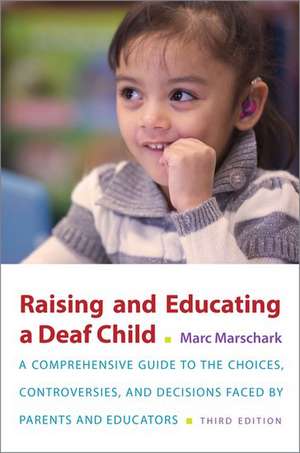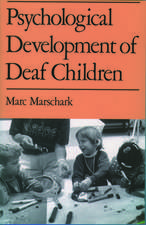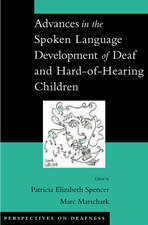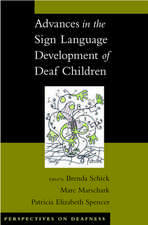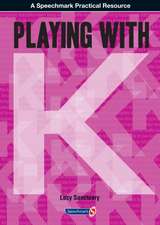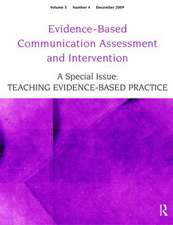Raising and Educating a Deaf Child, Third Edition: A Comprehensive Guide to the Choices, Controversies, and Decisions Faced by Parents and Educators
Autor Marc Marscharken Limba Engleză Paperback – 15 ian 2018
Deaf children are not hearing children who can't hear, and having a deaf child is not analogous to having a hearing child who can't hear. Beyond any specific effects of hearing loss, deaf children are far more diverse than their hearing age-mates. A lack of access to language, limited incidental learning and social interactions, as well as the possibility of secondary disabilities, mean that deaf children face a variety of challenges in language, social, and academicdomains.In recent years, technological innovations such as digital hearing aids and cochlear implants have improved hearing and the possibility of spoken language for many deaf learners, but parents, teachers, and other professionals are just now coming to recognize the cognitive, experiential, and social-emotional differences between deaf and hearing children. Sign languages and schools and programs for deaf learners thus remain an important part of the continuum of services needed for thispopulation. Understanding the unique strengths and needs of deaf children is the key.Now in its third edition, Marc Marschark's Raising and Educating a Deaf Child, which has helped a countless number of families, offers a comprehensively clear, evidence-based guide to the choices, controversies, and decisions faced by parents and teachers of deaf children today.
Preț: 248.86 lei
Preț vechi: 292.50 lei
-15% Nou
47.62€ • 51.93$ • 40.15£
Carte tipărită la comandă
Livrare economică 14-19 aprilie
Specificații
ISBN-10: 0190643528
Pagini: 296
Dimensiuni: 155 x 231 x 20 mm
Greutate: 0.42 kg
Ediția:3
Editura: Oxford University Press
Colecția OUP USA
Locul publicării:New York, United States
Notă biografică
Marc Marschark is a Professor at the National Technical Institute for the Deaf, a college of Rochester Institute of Technology, where he directs the Center for Education Research Partnerships. His primary interest is in relations among language, learning, and cognition; current research focuses on such relations among deaf children and adults in formal and informal educational settings.
